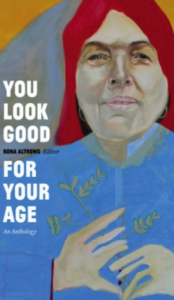By Annie Wesko
You Look Good For Your Age: An Anthology
Rona Altrows, Editor
University of Alberta Press (2021)
This is a brilliant collection of women’s writing about aging, some of which shows reluctant acceptance, some of which shows reinvention of oneself. Some stories are sad and debilitating. I wish to illustrate just a few to whet the readers’ appetites. My own story would show a 79-year old woman setting out on a new journey of love and enthusiasm for the last best years—not unlike the words of Joan Crate’s poem, One More Minute, “Just give us a few more fucking minutes” (190).
“I’M AWESTRUCK by the woman who used to occupy my body” is how Julie Sedivy begins her 10 page essay titled “Telescoping.” She writes about her earlier energetic, hectic schedule involving mothering, teaching, meetings, making dinner, reading bedtime stories to her children, writing in evenings, and muses,
Where was the fuel for all this activity? When I look back in time, I see a woman ravenous for expansion. The world was large and she wanted to pour herself into as much of its space as possible, to absorb as much of it into herself as she could. (201)
Joy Kogawa writes, “Forgiveness is the task I feel for this final leg of the journey. For me, its eternity’s path” (30).
Maureen Bush’s nonfiction piece, “Who Counts the Years?” shows a woman who embraces life and changes. Her secret:
I meditate …. Meditators let go of society’s assumptions and pressures, beliefs and values about aging. Instead we rest in silence, in vastness. Our faces light up, eyes dancing, warmth beaming out. And no one counts the years. (26-27)
Cecelia Frey’s “The Roxy Project” is a brilliant magic realism piece of fiction that astounds the reader, and even at its conclusion, one is still not sure what had transpired, so skillfully Frey renders her story about fighting against aging until finally embracing it.
Sharon Butala’s nonfiction story, “The Fixable,” is a thoughtful, honest offering of how she views aging. concluding with
If you’re lucky, as I am, this is how you get old: incrementally, your body wearing out bit by tiny bit, small wound by small wound, your soul wearing away with it all, thinning, loosening from its anchors, eternity coming closer every day. (12)
In her fictional piece Debbie Bateman explores extramarital sex and its thrills and complications. She recalls a poignant scene when husband confesses his transgression.
Joann McCaig writes of “the rights and freedoms of cronehood” (123). Her concluding words, “Be joyful. You are alive. You are still alive” (125).
“Lookin’ Back” by Lorri Neilsen Glenn relates how being young in its perfection is gawked at; yet “[d]ecades on, she notices she is rarely noticed … ” (273).
The last verse of Moni Brar’s evocative poem “Kissing Kismet Goodbye” reads,
An old crone,
Barren, with crows feet
Where birds used to alight
And dance on my face
In the corners of my eyes,
Before Miss was replaced with Ma’am (272)
Annie Frances Wesko formerly known as Annie Vigna, holds a B.A. in Russian (University of Calgary, 1997), and was the owner of Annie’s Book Company (1996-2007). Annie is a freelance editor, voracious reader, and book reviewer. She currently resides in the Municipality of Crowsnest Pass.

